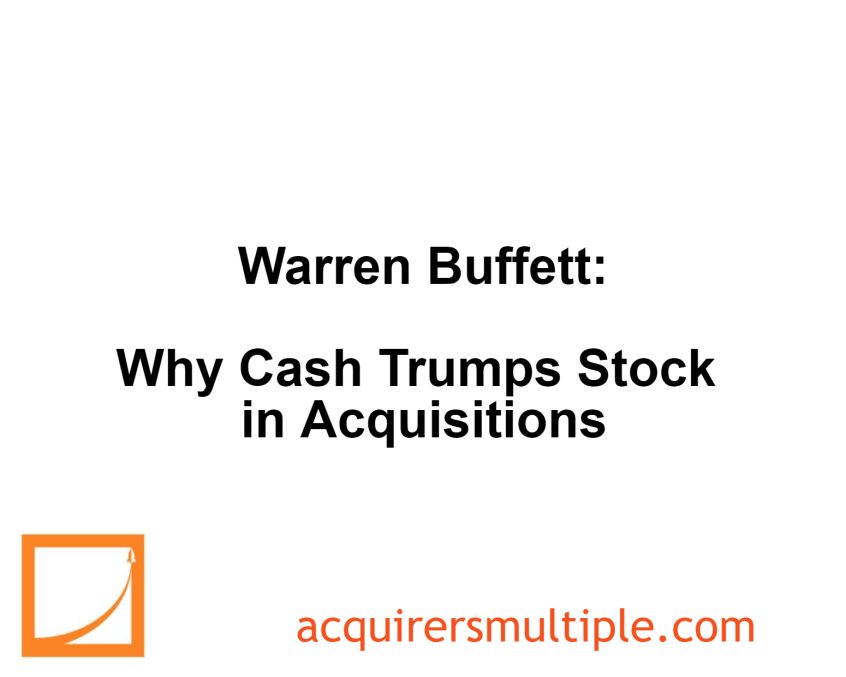In his 1997 Berkshire Hathaway Annual Letter, Warren Buffett discusses his strong preference for using cash over issuing Berkshire stock in acquisitions, citing a historical pattern of stock-only mergers resulting in shareholders being worse off. The difficulty arises from the ownership of a remarkable collection of businesses, making it challenging to justify trading a portion of them for something new. Here’s an excerpt from the letter:
I’ve mentioned that we strongly prefer to use cash rather than Berkshire stock in acquisitions.
A study of the record will tell you why: If you aggregate all of our stock-only mergers (excluding those we did with two affiliated companies, Diversified Retailing and Blue Chip Stamps), you will find that our shareholders are slightly worse off than they would have been had I not done the transactions.
Though it hurts me to say it, when I’ve issued stock, I’ve cost you money.
Be clear about one thing: This cost has not occurred because we were misled in any way by sellers or because they thereafter failed to manage with diligence and skill. On the contrary, the sellers were completely candid when we were negotiating our deals and have been energetic and effective ever since.
Instead, our problem has been that we own a truly marvelous collection of businesses, which means that trading away a portion of them for something new almost never makes sense.
When we issue shares in a merger, we reduce your ownership in all of our businesses—partly-owned companies such as Coca-Cola, Gillette and American Express, and all of our terrific operating companies as well.
An example from sports will illustrate the difficulty we face: For a baseball team, acquiring a player who can be expected to bat .350 is almost always a wonderful event—except when the team must trade a .380 hitter to make the deal.
Because our roster is filled with .380 hitters, we have tried to pay cash for acquisitions, and here our record has been far better. Starting with National Indemnity in 1967, and continuing with, among others, See’s, Buffalo News, Scott Fetzer and GEICO, we have acquired—for cash—a number of large businesses that have performed incredibly well since we bought them.
These acquisitions have delivered Berkshire tremendous value—indeed, far more than I anticipated when we made our purchases.
We believe that it is almost impossible for us to “trade up” from our present businesses and managements. Our situation is the opposite of Camelot’s Mordred, of whom Guenevere commented, “The one thing I can say for him is that he is bound to marry well. Everybody is above him.” Marrying well is extremely difficult for Berkshire.
So you can be sure that Charlie and I will be very reluctant to issue shares in the future. In those cases when we simply must do so—when certain shareholders of a desirable acquiree insist on getting stock—we will include an attractive cash option in order to tempt as many of the sellers to take cash as is possible.
Merging with public companies presents a special problem for us. If we are to offer any premium to the acquiree, one of two conditions must be present: Either our own stock must be overvalued relative to the acquiree’s, or the two companies together must be expected to earn more than they would if operated separately.
Historically, Berkshire has seldom been overvalued. In this market, moreover, undervalued acquirees are almost impossible to find. That other possibility—synergy gains—is usually unrealistic, since we expect acquirees to operate after we’ve bought them just as they did before. Joining with Berkshire does not normally raise their revenues nor cut their costs.
Indeed, their reported costs (but not their true ones) will rise after they are bought by Berkshire if the acquiree has been granting options as part of its compensation packages. In these cases, “earnings” of the acquiree have been overstated because they have followed the standard—but, in our view, dead wrong—accounting practice of ignoring the cost to a business of issuing options.
When Berkshire acquires an option-issuing company, we promptly substitute a cash compensation plan having an economic value equivalent to that of the previous option plan. The acquiree’s true compensation cost is thereby brought out of the closet and charged, as it should be, against earnings.
The reasoning that Berkshire applies to the merger of public companies should be the calculus for all buyers. Paying a takeover premium does not make sense for any acquirer unless a) its stock is overvalued relative to the acquiree’s or b) the two enterprises will earn more combined than they would separately.
Predictably, acquirers normally hew to the second argument because very few are willing to acknowledge that their stock is overvalued. However, voracious buyers—the ones that issue shares as fast as they can print them—are tacitly conceding that point. (Often, also, they are running Wall Street’s version of a chain-letter scheme.)
In some mergers there truly are major synergies—though oftentimes the acquirer pays too much to obtain them—but at other times the cost and revenue benefits that are projected prove illusory. Of one thing, however, be certain: If a CEO is enthused about a particularly foolish acquisition, both his internal staff and his outside advisors will come up with whatever projections are needed to justify his stance. Only in fairy tales are emperors told that they are naked.
You can read the entire letter here:
For all the latest news and podcasts, join our free newsletter here.
Don’t forget to check out our FREE Large Cap 1000 – Stock Screener, here at The Acquirer’s Multiple:



